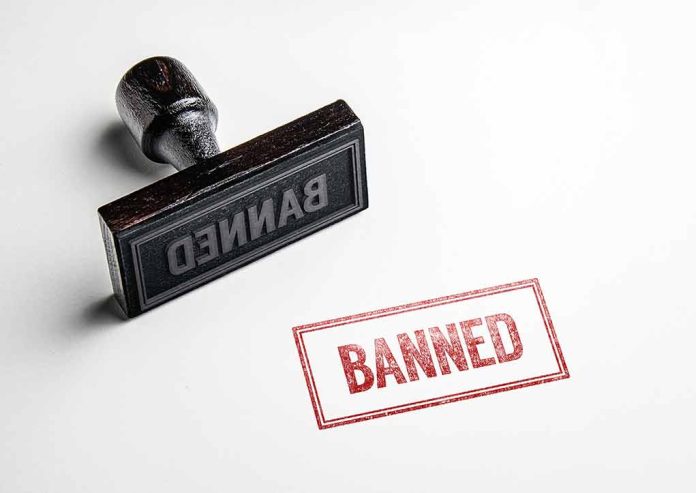🔴 Website 👉 https://u-s-news.com/
Telegram 👉 https://t.me/usnewscom_channel
Two more conservative-led states have boldly restricted junk food purchases with SNAP benefits, signaling a growing movement to promote health and fiscal responsibility in government assistance programs.
Key Takeaways
- Indiana and Arkansas have submitted waivers to the Trump administration to ban candy and soft drinks from being purchased with SNAP benefits.
- Arkansas Governor Sarah Huckabee Sanders became the first governor to officially request the removal of taxpayer-funded candy and soft drinks from food stamp purchases.
- Indiana Governor Mike Braun’s executive order cites statistics showing more SNAP money is spent on sugary drinks and candy than on fruits and vegetables.
- The initiative aims to improve the health of approximately 350,000 SNAP participants in Arkansas alone, with changes set to take effect in July 2026.
- Powerful food and beverage industry lobbyists oppose these restrictions, setting up a battle between public health advocates and corporate interests.
Conservative Governors Lead Charge Against Taxpayer-Funded Junk Food
Arkansas and Indiana have emerged as frontrunners in a conservative movement to reform the Supplemental Nutrition Assistance Program (SNAP) by restricting the purchase of unhealthy food items with government benefits. Arkansas Governor Sarah Huckabee Sanders announced her state has submitted a waiver to the Trump administration that would prohibit SNAP recipients from using their benefits to purchase candy and sugary beverages. The reform aims to improve nutritional outcomes for approximately 350,000 Arkansas residents who participate in the program while ensuring taxpayer dollars are not subsidizing unhealthy dietary choices.
“Today I was the first governor to submit a waiver to the Trump administration to end taxpayer-funded candy and soft drinks in food stamps,” said Gov. Sarah Huckabee Sanders.
The Arkansas plan, scheduled to take effect in July 2026, would ban the purchase of soda, energy drinks, sports drinks, and candy using SNAP benefits. In a policy shift that acknowledges practical nutritional needs, the state’s waiver request would simultaneously allow recipients to purchase hot rotisserie chicken, which is currently prohibited under federal SNAP guidelines. This practical approach demonstrates the state’s commitment to promoting beneficial nutritional choices rather than merely restricting options.
Indiana Follows Suit with Executive Action
Indiana Governor Mike Braun quickly followed Arkansas’s lead, signing an executive order directing state agencies to request similar waivers from the federal government. Braun’s order specifically targets candy and soft drinks, citing concerning data about SNAP purchasing patterns that show these items often outrank healthier alternatives in program spending. The initiative represents a growing consensus among conservative policymakers that government assistance programs should promote healthy choices and responsible spending.
“More SNAP money is spent on sugary drinks and candy than on fruits and vegetables. That changes today,” stated Gov. Mike Braun.
Both governors have framed their actions as fiscally responsible measures that serve dual purposes — improving public health outcomes while ensuring taxpayer dollars are spent appropriately. The restrictions acknowledge the well-documented connection between excessive sugar consumption and a host of health problems including obesity, diabetes, and heart disease, which collectively cost the healthcare system billions annually. By limiting junk food purchases through SNAP, these states aim to address preventable health conditions before they develop.
Industry Opposition and Public Health Debate
The American Beverage Association and other industry groups have predictably voiced opposition to these measures, arguing that such restrictions limit recipient choice and potentially stigmatize program participants. However, supporters counter that government assistance programs have legitimate public interest in promoting health outcomes and preventing taxpayer dollars from subsidizing products that contribute to chronic disease. The restrictions mirror policies already in place for other federal nutrition programs such as WIC, which has long maintained approved food lists focused on nutritional value.
The policy shift in these conservative states signals a potential turning point in SNAP program management. With federal approval now pending, other Republican-led states may soon follow with similar waiver requests. The movement reflects a broader conservative approach to welfare reform that emphasizes personal responsibility alongside government assistance. By maintaining support for genuine nutritional needs while restricting items with minimal nutritional value, these states are charting a path toward more effective and responsible public assistance programs.
As the Trump administration considers these waiver requests, the outcome could establish important precedent for how SNAP benefits are administered nationwide. The battle lines have been drawn between public health advocates who support nutritional guidelines and powerful industry interests that profit from the status quo. Whatever the decision, it will significantly impact how government food assistance programs operate in coming years.
